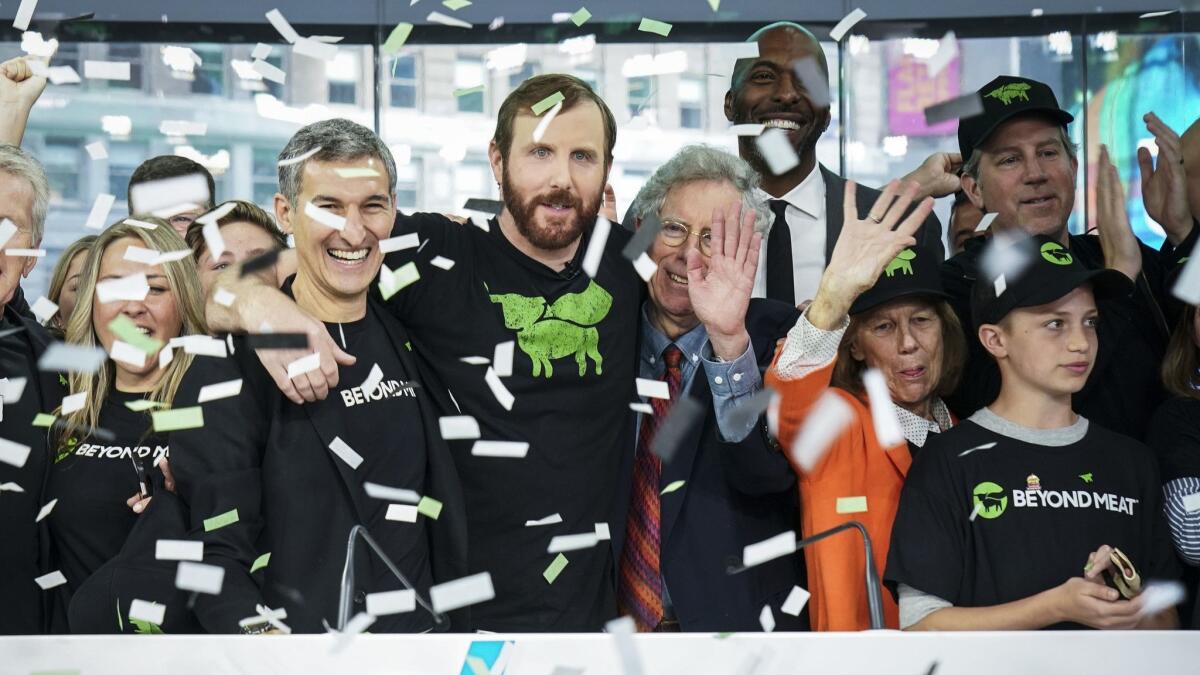Beyond Meat IPO: Stock skyrockets 163% as it hits public market

- Share via
Beyond Meat Inc. shares more than doubled in price in their first day of trading Thursday as the El Segundo maker of plant-based burgers and sausages went public with a splash.
After Beyond Meat raised about $240 million selling 9.6 million shares at $25 each, the stock rocketed to a close of $65.75 a share on the Nasdaq stock market. The 163% jump was the best debut of any U.S. listing since at least 2008 among initial public offerings that raised at least $200 million, and it gave the company an overall value of about $3.8 billion.
Beyond Meat is the first pure-play maker of vegan “meat” to go public, according to Renaissance Capital, which researches and tracks IPOs.
The 10-year-old company has attracted celebrity investors such as Microsoft co-founder Bill Gates and actor Leonardo DiCaprio and buzz for placing its products in burger joints such as Carl’s Jr. It sells to 30,000 grocery stores, restaurants and schools in the United States, Canada, Italy, the United Kingdom and Israel.
Beyond Meat Chief Executive Ethan Brown said the timing of the IPO was right because the company wants to expand overseas. He said he also wants consumers to be able to buy shares since they have fueled the company’s growth.
“It really is a wonderful feeling to be able to welcome people in who have helped this brand,” Brown said.
Still, Beyond Meat has never made an annual profit; it lost $30 million last year. It’s also facing serious competition from other “new meat” companies such as Impossible Foods and traditional players such as Tyson Foods Inc. Tyson recently sold a stake in Beyond Meat because it plans to develop its own alternative meat.
The IPO comes amid growing consumer interest in plant-based foods for their presumed health and environmental benefits. Annual U.S. sales of plant-based meats jumped 42% between March 2016 and March 2019 to $888 million, according to Nielsen. Traditional meat sales rose 1% to $85 billion in that same time frame.
In the NBA, fake-meat diets are changing the game »
One food-industry consultant said investors are taking a lot on faith with money-losing Beyond Meat.
The company’s valuation in its IPO is “entirely reasonable if it’s got internationalizable potential and a great product, and has capacity to make money in its core profit structure,” said Robert Lawson, CEO of London-based Food Strategy Associates. “But it’s not clear that Beyond Meat is that.”
The company will need to expand its product range to succeed outside the United States, where burgers aren’t as popular, Lawson added.
The trend toward embracing plant-based meats is not limited to the United States, however. U.K. sales of meat alternatives jumped 18% over the last year, while sales of traditional meat and poultry there slid 2%.
Even Burger King has recognized the appeal. This week the fast food chain announced that it would start testing the Impossible Whopper, made with a plant-based burger from Impossible Foods, in additional markets after its monthlong test in St. Louis proved successful.
Brown says Beyond Meat’s ingredient list — it uses only natural ingredients that haven’t been genetically modified, and it doesn’t use soy — sets it apart from competitors. Its products are made from pea protein, canola oil, potato starch and other plant-based ingredients. Its burgers “bleed” with beet juice; its sausages are colored with fruit juice.
Unlike competitors, Beyond Meat products have also been sold in the meat section of groceries since 2016. That has broadened their appeal beyond vegetarians. Beyond Meat says a 26-week study last spring showed that 93% of Kroger customers who bought its burgers also bought animal meat during the same period.
Health comparisons are mixed. A four-ounce 92% lean burger from Laura’s Lean Beef has higher fat and cholesterol than a Beyond Meat burger, but Beyond Meat’s burger has higher sodium and carbohydrates and slightly less protein. The lean beef burger is 160 calories; a Beyond Meat burger is 270 calories.
Brown says Beyond Meat is working on reducing sodium, which is a natural byproduct of its manufacturing process. But he also points out that red meat and processed meat have been classified as possible carcinogens by the World Health Organization.
Beyond Meat also costs more. For $5.99, consumers can get two 4-ounce patties of Beyond Burger or four 4-ounce patties of Laura’s Lean Beef.
Brown said Beyond Meat has a five-year goal of getting at least one product — most likely its beef-style plant-based meat — to cost less than the animal version. He expects the supply chain will grow as sales expand, which would lower the cost of raw ingredients such as peas.
Beyond Meat touts environmental benefits as well. The company says a plant-based burger takes 99% less water and 93% less land to produce than a beef burger, and generates 90% fewer greenhouse gas emissions.
Beyond Meat was founded in 2009 by Brown, a former clean energy executive. Brown’s family part-owned a Maryland dairy farm and as a child he spent weekends and summers on the farm. As he grew older, he began to question whether people really needed animals to produce meat.
Brown teamed up with two professors from the University of Missouri, Fu-hung Hsieh and Harold Huff, who had been developing soy-based “chicken” since the 1980s. By 2013, Beyond Meat was selling plant-based chicken strips nationwide at Whole Foods Markets. (The company discontinued its chicken this year but says it’s working on a better recipe.)
For investors, the stock is not without risk. Amid its annual losses, Beyond Meat must also continue to spend heavily on research and development. The company employs 63 scientists, engineers, researchers, technicians and chefs at its Los Angeles-area lab. It also has manufacturing facilities in Columbia, Mo.
Renaissance Capital, which has researched the company, says investors will probably tolerate the losses because the company is growing so quickly. Beyond Meat’s net revenue was $87.9 million last year, 170% higher than 2017.
In documents filed with the U.S. Securities and Exchange Commission, Beyond Meat says it will invest $40 million to $50 million in current and new manufacturing facilities and spend $50 million to $60 million on product development and sales. The rest will be used to pay down debt and fund operations.
Times staff writer James F. Peltz contributed to this report. Bloomberg was used in compiling this report.
More to Read
Inside the business of entertainment
The Wide Shot brings you news, analysis and insights on everything from streaming wars to production — and what it all means for the future.
You may occasionally receive promotional content from the Los Angeles Times.










